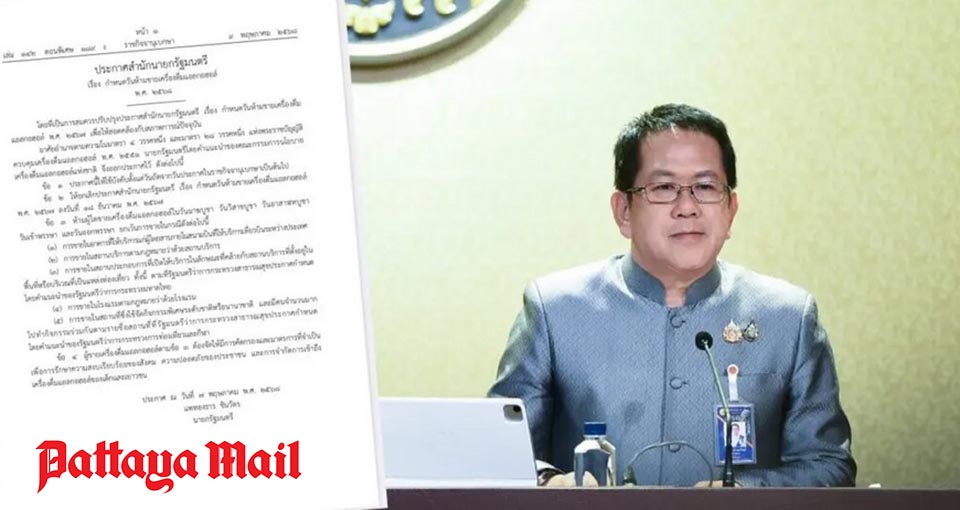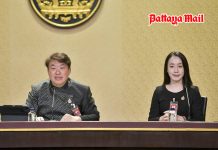
PATTAYA, Thailand – Jirayu Huangsap, the spokesperson for the Prime Minister’s Office, revealed that the Royal Gazette published an important update on May 9, as the government has relaxed restrictions on alcohol sales during religious holidays, effective from May 10.
The newly amended law allows alcohol sales on major Buddhist holidays—Makha Bucha, Visakha Bucha, Asalha Bucha, Khao Phansa (Beginning of Buddhist Lent), and Ok Phansa (End of Buddhist Lent)—under specific conditions.
However, the law applies only in five designated areas, meaning that not all establishments will be permitted to sell alcohol during these holidays.
The update to the Prime Minister’s original 2024 announcement aims to align with current circumstances, following recommendations from the National Alcohol Beverage Policy Committee to address evolving tourism and economic needs.
Key areas where alcohol sales will be allowed include:
- Airports with international flights.
- Licensed entertainment venues, such as clubs, bars, and karaoke establishments.
- Other businesses that are legally registered as service providers similar to entertainment venues, located in tourist destinations designated by the Ministry of Health and the Ministry of the Interior.
- Hotels with official operating licenses.
- Locations hosting national or international events that involve large numbers of participants, as determined by the Ministry of Tourism and Sports.
While this new policy is part of the government’s initiative to boost tourism during “Amazing Thailand Year” 2025, and directly benefits the hospitality and tourism industries, it comes with strict regulations. Businesses must ensure they follow protocols for screening and maintaining public safety. They must also ensure compliance with laws prohibiting the sale of alcohol to minors.
While the law does offer flexibility in certain tourist-centric areas, it has its limitations. For instance, food and beverage establishments like local convenience stores and restaurants that aren’t licensed as entertainment venues will still be prohibited from selling alcohol on religious holidays. Similarly, the provision for alcohol sales in hotels is restricted to those with official hotel licenses, which are not widespread in Thailand.
Taophipob Limjittakorn, Member of Parliament for Bangkok and member of the People’s Party, commented on the recent Royal Gazette announcement allowing alcohol sales during Buddhist holidays. He noted that many people, after seeing the announcement, may be preparing to celebrate, but emphasized that the law has not been fully abolished. The law still restricts the sale of alcohol on major Buddhist holidays; however, exceptions have been introduced for specific places.
According to Taophipob, establishments like convenience stores, grocery shops, restaurants, and large malls, which are not included in the updated law, will still be prohibited from selling alcohol.
He further explained that service establishments, including pubs, bars, and karaoke shops, can only sell alcohol if they are legally registered and have the appropriate licenses. For unlicensed establishments that operate similarly, alcohol sales will be allowed only in tourist areas.
However, it’s important to note that not all provinces are considered tourist areas, and the new regulations likely won’t apply across the entire country. Similarly, hotels that are allowed to sell alcohol must possess the proper hotel licenses, which are rare in Thailand and not applicable to all types of accommodation.
Taophipob cautioned operators not to jump to conclusions after seeing the news. He urged them to carefully check their establishment’s status to ensure they meet the exceptions before selling alcohol during these religious holidays. He expressed concern about potential legal repercussions for those who misinterpret the rules.
On a personal note, Taophipob stated that he believes it would be more effective to completely abolish the law, as the recent changes do not fully address the existing issues. For example, he pointed out that if someone needs alcohol like mirin or red wine for cooking, they still wouldn’t be able to purchase it from licensed establishments or hotels during the daytime on Buddhist holidays.
While the recent changes provide some flexibility for alcohol sales during religious holidays, Taophipob emphasized the importance of understanding the limitations and exceptions to avoid legal trouble.










